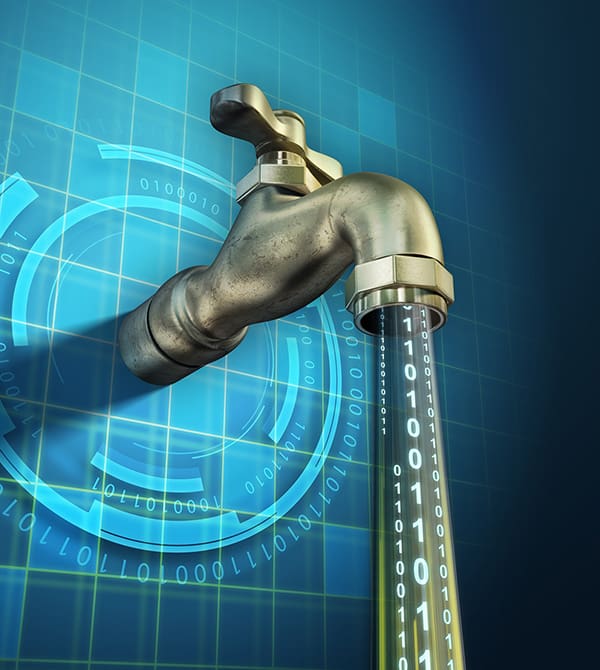
Above: Opening the spigot on data is one challenge the new Government faces. Digital illustration by Andrea Danti/DepositPhotos.
BitDepth#1007 for Seprember 22, 2015, part two of last week’s letter to Dr Rowley, Dear Prime Minister.
Almost a decade ago, I sat in a meeting at a state agency explaining the concept for an information kiosk that I believed could make a remarkable contribution to the legacy of that organisation.
One man sat quietly in the room until I was done and then asked with absolute precision, “How will that win us votes?”
I don’t think I’ve ever recovered from that moment, the instant my dreams of technology conquering wilful ignorance came crashing into the great wall of political imperatives.
I mention this because I want you to know, Prime Minister, that I understand the ruthless brutality of local party politics and the impetus that drives many high-level decisions.
But I also believe that someone in the office of the Prime Minister must, of necessity, cast an eye beyond the need to build a political base to the long term needs of Trinidad and Tobago.
There is no Prime Minister to date who has not contributed something to that bank of enablers of potential, but your mission in 2015 must encompass a vision but operate on a scale that’s much larger than five years.
One person responding to last week’s column insisted that the government needs to do more than simply provide what I described as “an enabling environment.”
On reflection, and even allowing for my own belief in a profit-driven market, as haphazardly and clumsily as that has served the cause of local technology development, I am willing to acknowledge that the government may need, eventually, to take a more proactive role in defining this country’s tech road map.
But the roads to that point are still to be authoritatively cut from today’s wilderness.
I mentioned the need to get serious about online payments, but another critical bit of legislation, the cybercrime bill also must be sorted out, ensuring that criminal acts and not neutral technologies are criminalised.
An opportunity to encourage the development of apps, websites and digital materials that support, if not replace, the curriculum was missed in the laptop distribution programme.
The development of an education ecosystem to fill the largely empty tanks of the 95,000 laptops distributed to school children is a second step, after the management of the devices themselves is more sensibly streamlined.
The lockdown of the hardware has proved to be a greater nuisance to legitimate users than to people determined to misuse the devices. The devices should be opened to a greater number of authorised, for-pay support options, another way to bring third party participation into the project.
eGovernment targeting the general public appears to have stalled with the posting of online forms and basic information resources of TTConnect, while eWaste recycling remains a fantasy.
Information Technology development reaches across many ministries. Education is obviously one. Social Development makes little use of technologies that have proven effective in building learning environments in other countries. If Rural Development is to rise out of box drains and into eager minds, it will find that path route readily through a considered deployment of technology and connectivity.
A National Security information network that finally closes the report books in police stations and turns the static information gathered nationwide into dynamic, readily referenced data for officers in the field and police strategy planners should be the focus of a police leadership team keen to empower field officers with their most critical weapon, information.
Open data, the fulcrum point for enabling transparent governance must become a pillar of your efforts to demonstrate rectitude in your leadership.
Procurement legislation that promises transparency must include mechanisms by which the process can be reviewed and interrogated.
The CSO and Central Bank must be tasked with providing more access to the background hum of data that is generated by the governance process in formats that encourage analysis and data pivoting. Far too much state data is released unhelpfully trapped in PDF files or masked by clever graphics that hide the bite of raw data with pretty animations.
That’s going to take some time, but in a couple of weeks, you have an opportunity to pluck some low hanging fruit in the preparation of the budget.
The national budget presentation has evolved into a statement that’s more of an extended promissory note and low-keyed politicking than a simple statement of fiscal intent matched by an accounting of the previous year’s expenditure.
While there are thousands of pages of supporting documents that hang off the budget statement, the address itself doesn’t meet even the most basic requirements of financial reporting that are required of the smallest private sector business.
So present a budget that aligns spending by ministerial sectors, call out the (no doubt positive) high points and link to the more expansive statements that detail the initiatives, their costs and procurement requirements.
Next year, account for that spending according to the budget plan and refresh the cycle. As the largest employer and spender in the local economy, the T&T Government should adhere to the planning and accounting standards it expects of every business operating in this country.
These initiatives will take you far from the eternal politician’s cycle of promises, preaching and propaganda, and no, they will not win you votes.
Pursue them and they will provide the bedrock for governance systems that are dramatically less vulnerable to corruption and far more transparent to public scrutiny.
That will win you respect.

